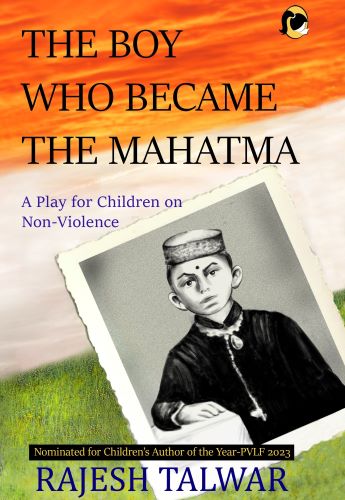Play for children on non-violence chronicling Mahatma Gandhi’s life

Tam L&M
A writer and legal advisor to the UN, Rajesh Talwar is all set to release his first play for children on non-violence chronicling the life of Mahatma Gandhi called The Boy Who Became the Mahatma (Ponytale Books).
The bestselling author of The Boy Who Wrote a Constitution which received critical acclaim and was shortlisted for the PVLF Awards, comes back with another a unique and exciting playwright with a contemporary feel adding to the modern-day relevance of Gandhi’s life as a young man fighting discrimination in South Africa.
SCENE 2
1875, Porbandar.
Mohan as Gandhi is referred to in the scenes in which he is a child, is six years old.2 The setting is inside a fairly large house. It is a large living room, with assorted furniture, including a settee, a table and a few chairs. There are doors leading to other rooms in the house. One of the doors leads to an open area kept for bathing. There is a partial view of this space from the stage. Mohan’s mother, Putlibai, who is wearing a saree comes out of one of the rooms.
Enter Putlibai
She goes to sit on the chair opposite the table in the centre of the room and starts to comb her hair, using a mirror, even as she sings a bhajan. She is alone in the room, and has almost finished.
Putlibai: (to herself) I am ready to go to the temple now. I suppose Monia is playing outside.
The main door at the entrance to the house is pushed open.
Enter Mohan
Mohan: Good morning, Mother.
Putlibai: Good morning, Monia.
Mohan: You seem to be getting ready. Are you going out, Mother?
Putlibai: Yes, as you can see Monia, I am dressed to go to the temple. Would you like to come with me?
Mohan: Not today, Mother. What temple are you going to?
Putlibai: To the Haveli – the Vaishnavi.3
Mohan: It’s your daily routine, Mother.
Putlibai: So it is, my dear son.
Mohan: Are you not eating today mother?
Putlibai: No, it’s the Chaturmas.4
Mohan: I don’t think a single Chaturmas has gone by, in which you haven’t kept fasts.
Putlibai: I suppose not, Monia.
Mohan: Last year you kept a fast every alternate day during Chaturmas.
Putlibai: Oh, you remember, Monia!
Mohan: Of course, Mother. I also remember how you fell ill last year, but still you kept on taking care of the family. Last Chaturmas you vowed not to eat food until and unless you had seen the sun in the morning and prayed to it.
Putlibai: (laughs) Yes, that was the case last year, wasn’t it?
Mohan: My brothers and sister5 and I would go out to look for the sun and call you once it was visible.
Putlibai: Yes, on so many days it was cloudy. It was the monsoon then.
Mohan: Mother, I remember that us children went out once and saw the sun and rushed to tell you. By the time you came out, the sun had gone behind the clouds.
Putlibai: (laughs) Yes, I recall that as well.
Mohan: What astonished me, Mother, was how cheerfully you announced you would not eat because although we had seen the sun when it came out, you yourself had not seen the sun. According to you it meant that God did not want you to eat just then.
Putlibai: (laughs) Yes, indeed.
Mohan: Don’t you feel hungry, Mother?
Putlibai: Of course, I feel hungry, Monia.
Mohan: But still, you manage not to eat?
Putlibai: It takes some practice, but it’s not so difficult.
Mohan: Mother, many days you only eat one meal a day.
Putlibai: That is true.
Mohan: For myself, I feel hungry in the morning, and then in the afternoon, and again at night!
Putlibai: That is good, Monia. You are young and you should eat well, so that you grow up to be strong.
Mohan: I would like to be strong, Mother. (pause) Do you know why?
Putlibai: It’s anyhow good to be strong, Monia, but what is your reason?
Mohan: A friend in school told me that the Englishman rules over us because he is stronger than us. There is a poem I heard at school: ‘Behold the Mighty Englishman; He rules the Indian small.’
Putlibai: Ah, yes. It’s the Gujarati poet, Narmad.
Mohan: At school, all the boys know the poem. All of us need to become strong. If we can all become strong, we will be able to throw out the Englishman.
Putlibai: (ruffles his hair) That’s my brave boy. (pause) But Mohan, did you know that real strength is that of the mind?
Mohan: (thoughtfully) The way you are, Mother. You have such a strong mind. You don’t allow the stomach to tell you when to eat. You decide when to feed the stomach, isn’t it? Isn’t that what you mean? Don’t you feel hungry again after eating just the once?

